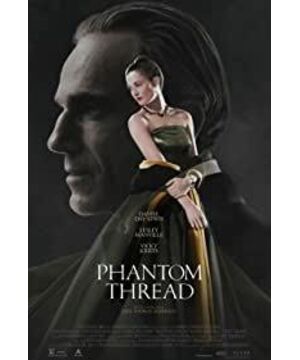Paul Thomas Anderson_Phantom Thread_2017
6.9
Roland Barthes said that from the past to the present human beings have only one story, the story of Oedipus. I don't know about the others, but this film is really an Oedipus story. Oedipus complex is buried everywhere, perhaps to explain the final strong dramatic reversal. The inhumane inner world of the paranoid winner in life is probably an old-fashioned story that has been told all along. But such a conclusion is obviously against the perspective of the film, because most of the time this film alienates the audience from the hero's heart and gets closer to the heroine's position. In the quiet atmosphere created by classical sound and painting, what we capture is more of a subtle transfer of power.
Of course, one of the big issues involved here is the closure of the story, and until the last few minutes I had a weird look and feel. The reason is that there is only a female voice narration from beginning to end, but the male protagonist's perspective is interspersed in the story. Although in the last scene, we were surprised to find that the hero was also present when the heroine was narrating, the explanation of this scene was still unable to offset the previous negative perception. "Reynolds made my dream come true, and in return, I gave him what he wanted the most - my everything." Apart from this horror that needs to be looked back, I personally feel that this narration is not useful.
In terms of character structure and image quality, this film is reminiscent of Hitchcock's "Butterfly Dream", claustrophobic but very delicate. I especially like the dance party and the mushroom eating part. The function of the housekeeper is also one of the similarities, but the role of the sister here is somewhat vague. Many times her positions are inconsistent with each other, and she seems to be dispensable after the key plots appear. After watching the film, it is inevitable that she will be puzzled, and she cannot be sure whether the previous reaction scenes are conspiracy.
This film purifies all the factors of location, wealth, age, and occupation when describing emotions. Even if these are discarded, the two extremes of men and women are still destined to be unable to get along. A man is a person with a strong desire to control, and his life is full of demands on the people around him; he has zero desire for possession, and those who can't stand him will be let go directly; the heroine has zero desire for control, no requirements and no taste; possession The desire is very strong, from the small plot of saying "I live here" to the princess to the big turning point of feeding poisonous mushrooms. These two typical extreme characters are quite common in romance films, which greatly reduces the difficulty of the play, but the integrity of the character arc and some details are worthy of praise.
There is an old joke about love, if a gun is pointed at your lover, you will stand in front of the gun and say "don't shoot, let me do it", and the heroine in the story also shows the relationship between the sexes in the second half. In a certain complex dimension, the two actions of attachment and destruction can exist in affection at the same time. Thanks to her early publicity, the creator did not provide any openness in the process of drawing the dramatic arc for her. This emotionally suppressed design is also highly compatible with the texture of the image.
The plumpness of the male protagonist is mainly due to his professional drama. He seems to reveal the attributes of the tailoring profession, that is, to achieve the ultimate will materialize everyone. On the first date, he asked his sister to intervene, saying that the heroine has an ideal model body, which is clearly referring to the reason for this relationship. Different from the psychological distortion caused by the emotional depression of the heroine, the internal transition of the hero is completed instantly by eating poisonous mushrooms. The rationality for the two to take what they need in the ending can only be explained by the Oedipus plot laid out with symbols in the front, which is somewhat monotonous and simple.
The front is better than the back, which is my opinion on the film. This is the case for professional scenes, because the tailoring attributes on him are no longer unique as the further progress is made; the same is true for emotional scenes, especially after the poisonous mushrooms are picked, as the story develops, the content they discuss seems to gradually tend to be single. It's like a scientific experiment. Both of them intend to judge the essence through the phenomenon. Is the beautiful feeling that both of them enjoy when they are sick, is it the love they understand? With this question in mind, the heroine poisoned again, and the hero ate it again. However, the seemingly rational structure came to an abrupt end with the plot reversal. There is only drama and no attitude, and there is a little regret here.
View more about Phantom Thread reviews











